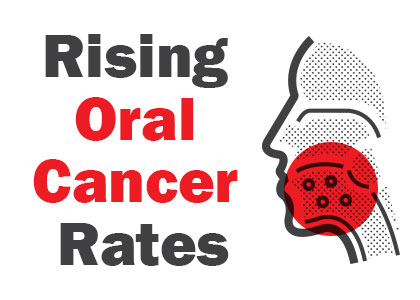Blog
Rising Oral Cancer Rates – Have You Been Screened?
 The prevalence of oral cancer in America is increasing, with an estimated 49,750 people being diagnosed in 2017 alone. Of those newly diagnosed individuals, it is projected that only 57% will live 5 years beyond receiving the news. Oral cancer will cause almost 10,000 deaths annually, equating to nearly 1 person per hour.
The prevalence of oral cancer in America is increasing, with an estimated 49,750 people being diagnosed in 2017 alone. Of those newly diagnosed individuals, it is projected that only 57% will live 5 years beyond receiving the news. Oral cancer will cause almost 10,000 deaths annually, equating to nearly 1 person per hour.
These statistics are a lot to digest and can cause quite a bit of fear. This fear might be elevated when we look at the reason oral cancer death rates are high—not because it’s more difficult to remove, but because it’s usually discovered in late stage. This makes sense knowing that only 14-18% of dentists in the United States screen for oral cancer. That’s right, 14-18%.
However, Portland dentist Dr. David Case wants to provide you with peace of mind by educating you on what to look for and screening you for oral cancer regularly. Read on to learn more and feel free to give us a call with questions and concerns.
Open Up
A lot of us feel we’re familiar with the appearance of our mouths. We conduct diligent oral hygiene routines (we certainly hope this is true!) and take note of any discomfort, pain, and/or abnormal coloring of our tongue, teeth, and gums. But what about your cheeks, hard and soft palates, uvula, tonsils, and underneath your tongue? Do you regularly examine your inner lips, lift the top and lower the bottom in order to see more of your gums?
If you don’t, there is no need to feel guilty or panicked, but it’s probably a good idea to start paying closer attention to what’s going on in your mouth. Now you may be asking, “But what am I supposed to be on the lookout for?”
Is This Normal?
First, no two mouths will look identical, as evidenced by how people can be identified post-mortem with dental records. While this fact may seem morbid, it illustrates how each smile is unique, which is one of the reasons Dr. Case loves being a dentist.
That being said, there are some telltale signs and symptoms of oral cancer that you should make Family Dental Health or your primary care provider aware of if you notice them:
- A sore (or several) located on your lip, tongue, the roof of your mouth, or gums, that does not heal within two weeks.
- Discolored (white, red, black) patches anywhere in your mouth.
- Swelling, lumps, bumps, or new growths in your mouth, especially if they’re located on one side and not the other.
- Pain or difficulty in
- Stiffness or pain when moving the jaw or tongue.
- Persistent ear and/or head pain and aches.
- Unexplained bleeding or numbness in your mouth.
- A sore throat or feeling of a lump in your throat that does not heal.
- Changes in the fit of your dentures or other dental appliances.
Is Oral Cancer Preventable?
There are factors that increase your risk of oral cancer, but it is important to note that 25% of oral cancer cases are diagnosed in people whose risk factors are low. It’s even more crucial to be self-examining frequently and regularly screened for oral cancer if any of the following apply to you:
- Tobacco use
- Frequent alcohol consumption
- HPV (human papillomavirus)
- Family history of cancer
- Excessive exposure to the sun (especially in adolescence)
Advanced Technology to the Rescue
Dr. Case uses a tool called VelScope® to perform oral cancer screenings. VelScope is a handpiece that emits a safe blue light, the best for observing what is called tissue fluorescence. The VelScope enables us to see cellular, structural, and/or metabolic changes that could indicate the need for testing. We may apply light pressure while examining with the light, a technique called blanching, to observe how questionable findings respond.
If anything seems suspicious, we will remove some cells for biopsy. If the results are negative, we can breathe a sigh of relief with you. If they happen to be malignant, it’s best that we find out early to double your chance of recovery.
If you’re concerned about oral cancer, don’t delay scheduling your visit. Contact us today for peace of mind!
The content of this blog is not intended to be a substitute for professional medical advice, diagnosis, or treatment. Always seek the advice of qualified health providers with questions you may have regarding medical conditions.
